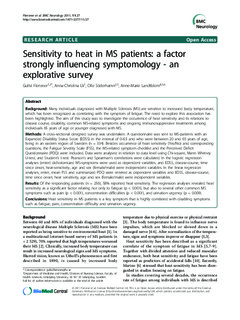| dc.identifier.citation | Flensner, G., Ek, A.-C., Söderhamn, O., & Landtblom, A.-M. (2011). Sensitivity to heat in MS patients: a factor strongly influencing symptomology -- an explorative survey. [Article]. Bmc Neurology, 11(1), 27-34. doi: 10.1186/1471-2377-11-27 | en_US |
| dc.description.abstract | Background: Many individuals diagnosed with Multiple Sclerosis (MS) are sensitive to increased body temperature, which has been recognized as correlating with the symptom of fatigue. The need to explore this association has been highlighted. The aim of this study was to investigate the occurrence of heat sensitivity and its relations to disease course, disability, common MS-related symptoms and ongoing immunosuppressive treatments among individuals 65 years of age or younger diagnosed with MS. Methods: A cross-sectional designed survey was undertaken. A questionnaire was sent to MS-patients with an Expanded Disability Status Score (EDSS) in the interval of 0-6.5 and who were between 20 and 65 years of age, living in an eastern region of Sweden (n = 334). Besides occurrence of heat sensitivity (Yes/No) and corresponding questions, the Fatigue Severity Scale (FSS), the MS-related symptom checklist and the Perceived Deficit Questionnaire (PDQ) were included. Data were analysed in relation to data level using Chi-square, Mann Whitney U-test, and Student's t-test. Pearson's and Spearman's correlations were calculated. In the logistic regression analyses (enter) dichotomized MS-symptoms were used as dependent variables, and EDSS, disease-course, time since onset, heat-sensitivity, age and sex (female/male) were independent variables. In the linear regression analyses, enter, mean FSS and summarized PDQ were entered as dependent variables and EDSS, disease-course, time since onset, heat sensitivity, age and sex (female/male) were independent variables. Results: Of the responding patients (n = 256), 58% reported heat sensitivity. The regression analyses revealed heat sensitivity as a significant factor relating not only to fatigue (p < 0.001), but also to several other common MS symptoms such as pain (p < 0.001), concentration difficulties (p < 0.001), and urination urgency (p = 0.009). Conclusions: Heat sensitivity in MS patients is a key symptom that is highly correlated with disabling symptoms such as fatigue, pain, concentration difficulty and urination urgency. [ABSTRACT FROM AUTHOR]
Copyright of BMC Neurology is the property of BioMed Central and its content may not be copied or emailed to multiple sites or posted to a listserv without the copyright holder's express written permission. However, users may print, download, or email articles for individual use. This abstract may be abridged. No warranty is given about the accuracy of the copy. Users should refer to the original published version of the material for the full abstract. (Copyright applies to all Abstracts.) | en_US |
